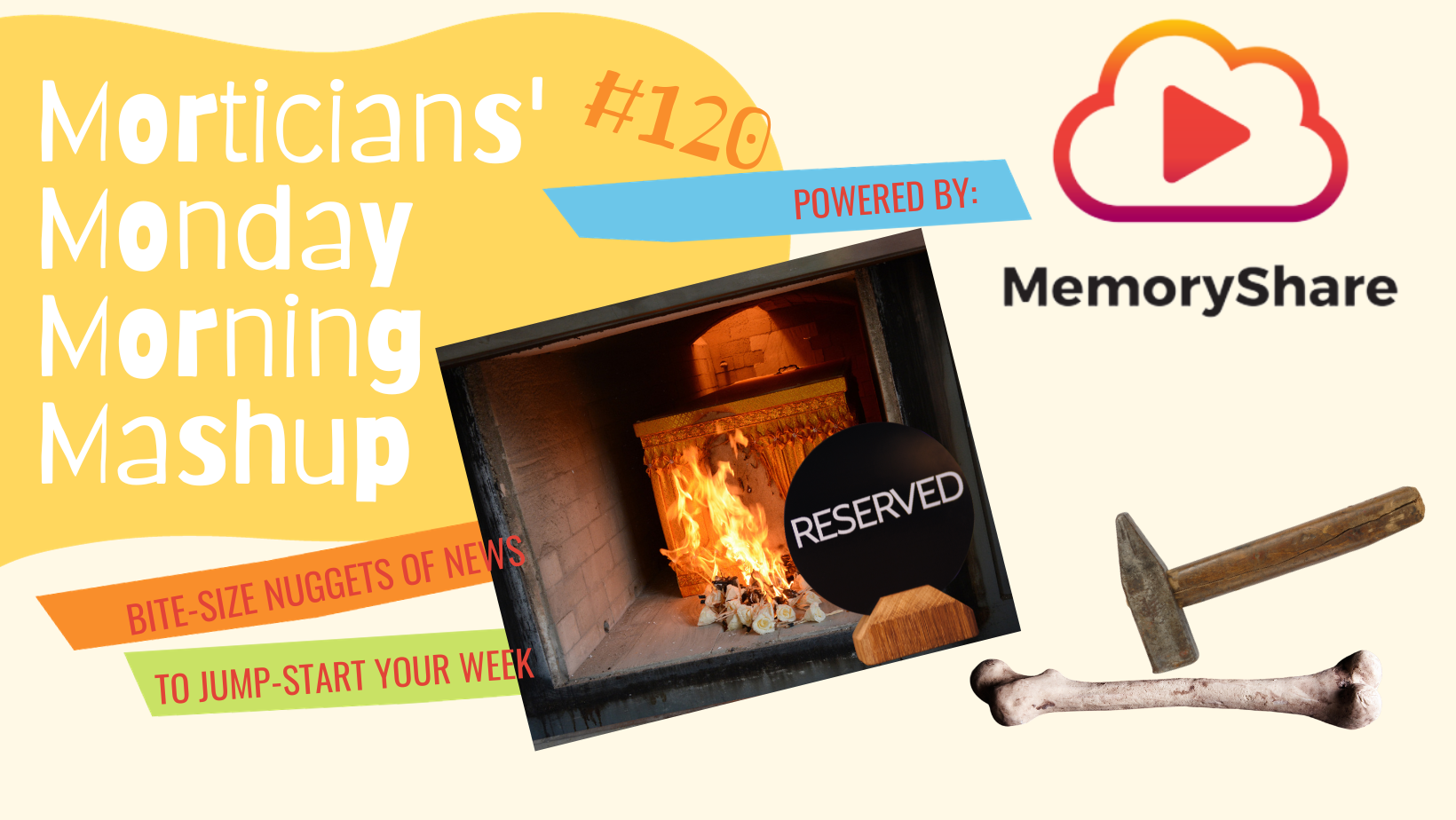Bone Crushers & Cremation Reservations | 4M #120
Welcome to the hundred-and-twentieth edition of Morticians’ Monday Morning Mashup, 4M #120, where we’ll serve up bite-sized, easily-digestible nuggets of the deathcare news you need to crush conversations in the week ahead. Bon appetit!
This newsletter is powered by MemoryShare, a funeral livestreaming platform that you can set up in 30 seconds or less.
Bougie retorts
A funeral home in China has “sparked controversy” by offering tiered pricing on cremations — not the services surrounding the cremation, but the actual cremation itself. Apparently, pricing is based on the “quality of the furnaces they used” during the process. A funeral home staff member told the news that “ordinary furnaces are simpler in structure, while high-end ones are more luxurious and tailored to specific needs of the relatives. Thus, we charge more.” What?? Well, according to this story, some “low-grade furnaces might not fully cremate remains, potentially requiring families to crush the bones personally and even causing families to inadvertently collect the ashes of others.” So, following that logic, the “specific need” of family members is to not have to “crush the bones personally” of their loved one?
Math
A North Dakota TV station recently interviewed a local funeral director about the rising costs of funerals, citing the NFDA’s reported average funeral cost of $8,000+ as an increase of 5.8% over the last two years. Now, I’m far from a math whiz but if the annual U.S. inflation rate in 2022 was 6.5%, and the rate increase for 2023 was 3.1%, isn’t that cumulative increase of 9.6% still significantly more than the increase in the average funeral cost? And doesn’t that mean U.S. deathcare providers are paying more, but still charging less? Like I said, math is hard, but shouldn’t the critics give you guys a break? The funeral director in the article did a wonderful job providing an eloquent and logical explanation for the increase in costs, which you can read here.
Hallford updates
If you’re following the terrible Return to Nature tragedy and upcoming trial, here’s last week’s update, along with an interesting revelation about Jon Hallford’s background:
- A Colorado judge lowered Hallford’s bond from $2 million to $100,000
- Carrie Hallford will appear in court next week to request a lower bond
- Prosecutors read some of Hallford’s texts from 2020 in court, including these:
- “My one and only focus is keeping us out of jail”
- “I go to prison, which is probably what’s going to happen”
- Hallford is an honorably discharged U.S. Army veteran
Cremation backlog
Korea is still suffering from a rising death rate (due to aging and other factors) that has led many families to break a longstanding funeral tradition. Typically, and preferably, funerals are held on the third day following a death. However, the backlog at crematories, which are being run round-the-clock, means that only about 64% of cremations are taking place on the third day, with the rest being four or more days. In Seoul, that percentage is flipped, with only 34% of cremations happening on the third day, and the rest being later. Families seeking a quicker cremation outside of Seoul may be charged as much as eight times the regular costs as non-residents. The problem is so prevalent that families are making “crematorium reservations” before a dying person has officially passed.
Won’t you be my neighbor?
The owners of a historic cemetery in Bend, Oregon are hoping the local government will grant their request to change the zoning of the property to “residential.” They’d like to ready an unoccupied section of the cemetery for potential residential development, as property is currently at a premium in the area. The property is currently zoned as “public facilities,” a zoning unusually reserved for public parks and schools. Cemetery zoning isn’t always top of mind for most of us, but wouldn’t “residential” be a more accurate option anyway, as that’s kind of what’s happening there? People are “residing” there … forever? And couldn’t certain plots or mausoleums be considered “multi-family residential?” (Yep, there’s a reason we’re not in real estate.)
Say goodbye to Facebook
If you’re using Facebook for live streaming, does this sound familiar?
- Copyrighted music is silenced (even with proper certifications!)
- Advertisements out of your control pop up during the livestream
- It’s difficult for families to access because it requires a Facebook account
This is why Carlton Stevens Jr., Operations Manager and Mortician at Stevens Funeral Home in North Carolina, said goodbye to Facebook and switched to MemoryShare—a live streaming platform built specifically for funeral professionals.
“Now, families don’t have to worry about Facebook accounts. It works, and it’s easy to use,” Carlton said. “It’s the best, I’m telling you. It’s liquid gold.”
After he started offering live streaming during the pandemic, Carlton saw Stevens Funeral Home call volume bump from 20 calls to 41 calls.
Today, Stevens Funeral Home live streams a service every other day.
And with MemoryShare, all they have to do is push a button.
“It’s a no brainer,” Carlton said.
Read how Carlton is using livestreaming to grow his business in our latest case study—click here to read it!




